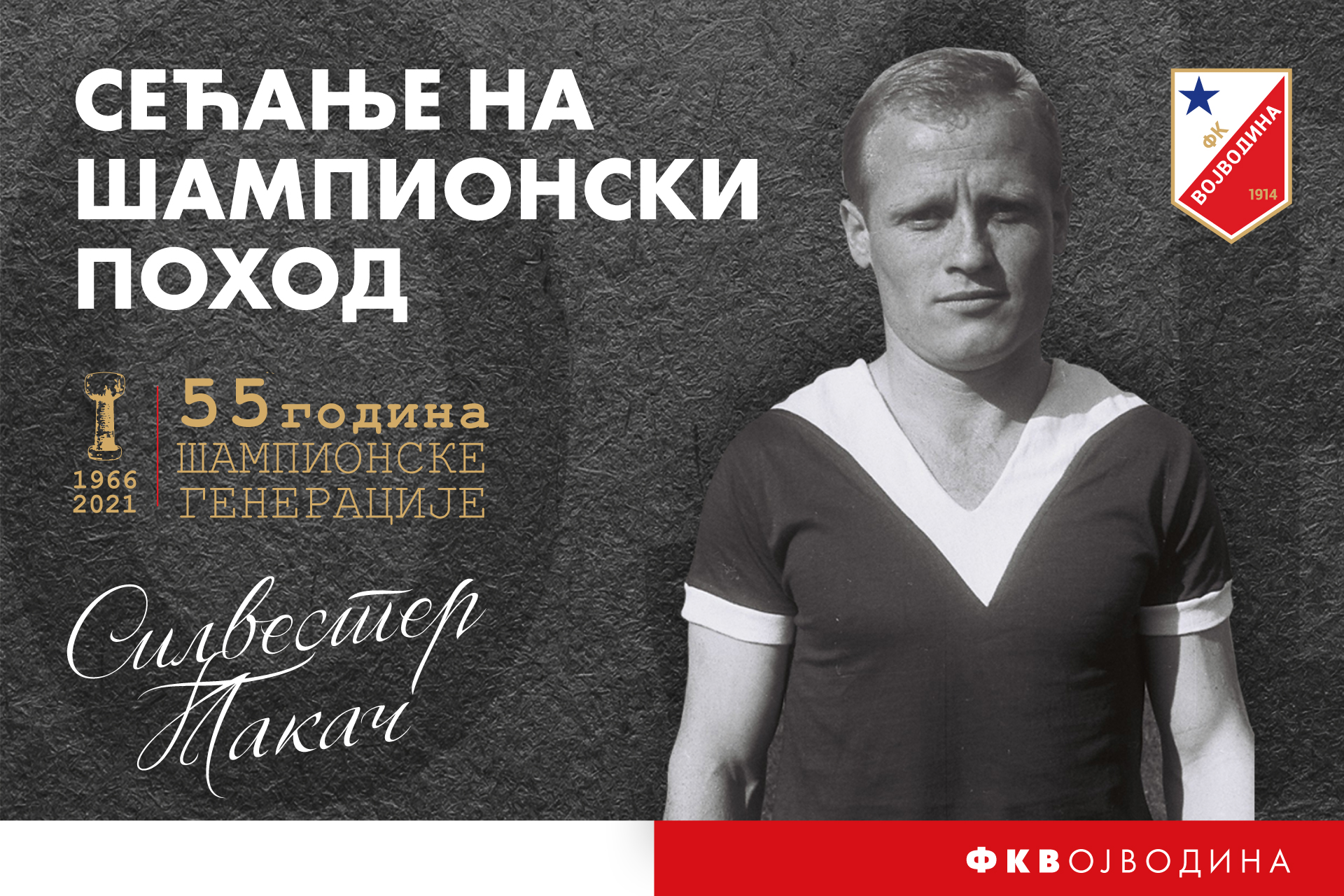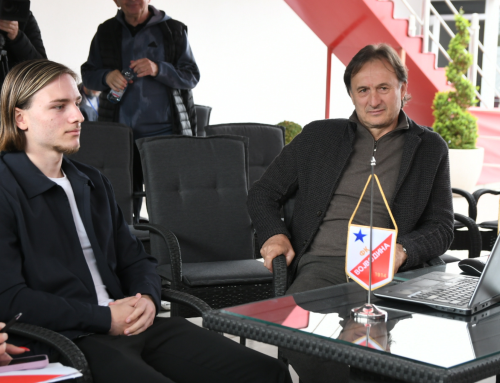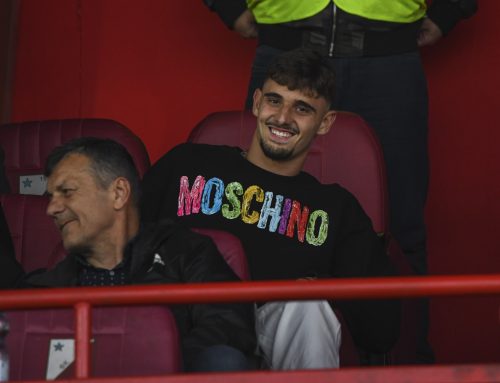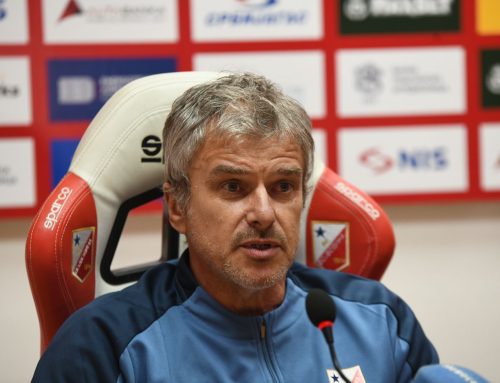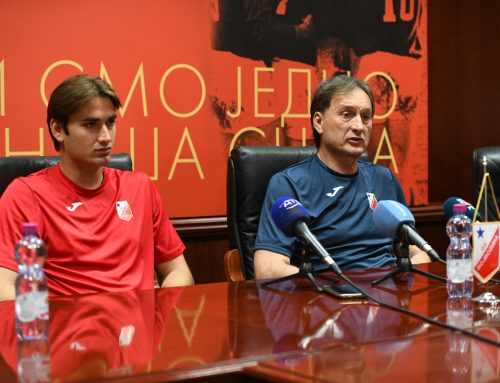The year is 1965. In post-war Yugoslavia, the myth of the “big four” still lives on. Red Star, Partizan, Dinamo Zagreb and Hajduk Split take turns on the championship podium of the then First Federal League of Yugoslavia. During the previous 19 years, not a single team appeared that managed to break the dominance of the “big four”, and then a wonderful generation appeared. In the 1965/66 season, Vojvodina won the championship title ahead of second-placed Dinamo and third-placed Velež.
One of the most deserving for that historic title was Silvester Takač, the best scorer of Vojvodina with 13 goals in 30 games that season, out of a total of 245 goals in 426 matches during the nine years in the first team of the red and whites.
As the best scorer, with four goals in the then European Champions Cup, he led Vojvodina to the quarterfinals of the then most elite European club competition. In the Round of 16, against Atletico Madrid, he said goodbye to his Old Lady in the best possible way. As the host, Voša won the first leg with the result 3-1, and Takač scored the first goal. In the second leg, Atletico celebrated with 2-0, so, according to the rules of the time, the third game was played.
The then technical director of Vojvodina, Vujadin Boškov, accepted the offer of Atletico to play the third match in Madrid, instead of on a neutral pitch. Were it not for Silvester Takač, it might have been a fatal decision. Atletico took the lead with 2-0 after only six minutes. Takač scored a goal for 1-2, and Voša managed to win in overtime, in which Takač scored the third goal for a turnaround and the final 2-3, thus providing Vojvodina with the greatest success on the international scene, which no generation of the Old Lady to this day has managed to repeat. After that historic victory, Takač signed for French Rennes, and Voša, without one of its best players and the first goal scorer, failed to eliminate Scottish Celtic, which later lifted the European Champions Cup.
This year, FK Vojvodina marks the 55th anniversary of winning its first championship title, and the memories of Silvester Takač of that great success still do not fade.
– There are many beautiful memories of that year, but the first thing I want to emphasize is the very good atmosphere in the team and in the club. We hung out, spent time together and off the pitch. This affected both the results and our games. I also remember our great victories, how we beat Red Star 3-0 at half time in Belgrade, and then Partizan, which played the finals of the European Champions Cup with Real Madrid that season. It was a year to remember because of many things – begins the story Silvester Takač, who 55 years later remembers the incredible details from the period when he wore the Old Lady jersey.
Vojvodina was the first to dispel the myth of the so-called “big four” of Yugoslav football. How difficult was it to become the first team to win the title ahead of Red Star, Partizan, Dinamo and Hajduk?
– We had a goal from the first day of preparation. In fact, we had the same goal the year before, but then it was not so realistic to be champions. We lost two or three games and, as they say, that’s how our dreams disappeared. The following season, that summer of 1965, the then director, the legendary Vujadin Boškov, had the best transfer window. We were strong, but we were additionally strengthened by Brzić, Trivić and Savić. Along with a good team, there was also our huge desire. It didn’t start so fabulously, because we lost in the first game in Skopje. But as the season progressed, we were getting better. We beat Partizan in Novi Sad. We beat Dinamo in Zagreb, and one half changed everything. We played against Red Star in Belgrade and we were leading 3-0 at half time. It was a huge success, for us the first and biggest confirmation that we do not dream in vain. At halftime, we entered the locker room and were speechless. After that game, it was clear that we had to be champions.
That season, Vojvodina won the title with as much as an eight-point advantage over second-placed Dinamo, at a time when only two points were won per victory. What was the key to that team’s success?
– In order for a team to be good, three things are necessary – the president and director of the club, a good coach and a good squad of players. All this must be fulfilled and matched in order for things to function properly on the pitch as well. President Aka Kovačević and director Vujadin Boškov were unprecedented authorities. Beside them, no one was allowed to yell. Strict, fair, dignified and always in place. Coach Stanković also insisted on discipline and physical fitness. We used to be able to complain, because you know, it’s not nice for players to run a lot without the ball, but we respected his word. We believed he was doing the right thing and he trusted us. That mutual trust and respect was transferred to the pitch. We were, maybe, without big names at the time. Not much was expected of us, because when you play in a big club, such as Real Madrid, then you are expected to be champions from day one.
Which matches were crucial in the championship race, ie which victories turned out to be the most important in the fight for the trophy?
– We were that full of confidence that even when we were losing, we never thought we would lose. We trampled all rivals. As I said, Partizan played the finals of ECC that year, and we beat it both times. We broke Red Star in the middle of Belgrade. We also beat Dinamo in Zagreb. That year, no one could beat us. Those triumphs were the most important. That is how we realized that Vojvodina can not only compete with them, but can also beat them.
With 13 goals in 30 championship games, you were the top scorer of the first champion team of Vojvodina. What is it that most distinguished you as a player and profiled you as one of the best football players of that time in Yugoslavia?
– I believe that it was crucial that from a young age I had the sense to score a goal, from any position. That was said many years later by my first and best coach Franja Hirman, who was a center forward and could smell goal scorers. On one occasion, I asked him what I should play, because I played right wing in Voša, then center forward in Rennes, then left in Standard, and Franja told me – “only center forward”. I believed that I was a winger and that is how I behaved, because I was not eager to score goals. There was no defender I couldn’t predict. I was relatively fast, because in the first five meters I could escape everyone. From my idol Toza Veselinović, I learned when and where I should run, to feel the empty space. He was a grandmaster. He knew exactly when to run into the depths, and I watched and learned and learned. I shot penalties and free kicks, I could do it with both my left and right foot. However, I think what adorned me the most was that I always gave my best in training. By age, I may not have been the oldest in that team, but I was among the older ones in terms of experience. If, as such, I commit to training, then I take the others with me. So we built a hierarchy. That season, I don’t even know how, I was the best scorer of the team, without that being my goal at all. I was always happier when I assisted my teammates for goals.
I don’t know if it’s known and ever published, but I was on the radar of some foreign clubs that season. Some people from abroad came and told me that coaches and directors from Rennes, Marseille were coming to watch me. However, no one from the club told me that. Tempo journalist Jovica Veličković was a special guy, so I found out from him, and French journalists called him to inquire about me, because they wrote that Rennes wanted me. He discreetly told me “watch out, they’re watching you today”. What did I know about it then and how it goes? They once watched me against OFK Beograd. Coach of Rennes came, we lost, and I was nothing special. In the second half, they put me to play central forward for the first time, because they needed a center forward. That’s why I later played central forward in Rennes. After that, we were going to Madrid soon. President Kovačević then told me that some foreign coach would come and that he wanted me to sign for them. Even before the first game in Madrid, I had already signed for Rennes. Maybe people didn’t believe we could beat Atletico, I don’t know, but that was the time.
In addition to having the best team, many believe that Vojvodina had the best coach Branko Stanković that season, that is, the best management, led by technical director Vujadin Boškov. What was their contribution to winning the title?
– Stane got quality players together that summer of 1964, which were completed after a year with the arrival of Brzić, Trivić and Savić. He made extraordinary preparations. Physically and morally at the highest level, with a good atmosphere, we were superior to everyone. Morality never declined. There was no game when we thought we were going to lose. We had quality players, who were not appreciated enough before that title. And then, as I believe today, the players from Vojvodina had a hard time getting to the national team, and we all know very well how important it was to be a member of the national team. Stane and Vujke made that team from which many later became members of the national team. At that time, most importance was given to what Boškov and Stanković did for that, but also President Kovačević. Their contribution was crucial, but nothing could have happened if the generation did not have such talent, such unity, friendship and the desire to win and become a champion.
As for Vujadin Boškov, he was a big name, a great football player. I played with Vujke for two or three seasons, but we didn’t have many games, because he had to join the army first, and then he suffered two broken legs. He had such behavior and authority that he radiated at every moment, with every sentence. Vujke made fantastic transfers. What he managed to sign then, probably with the authority of his word, even richer clubs could not do then. Later, as a coach, he built a name, and it is interesting that he was never a coach in the former Yugoslavia, but he was in one Real Madrid. We met once in Liège, I was playing in Belgium at the time. Such a person is rarely born. After all, even when he died, big names from Italy came to the funeral. That was Vujke.
In your last match in the Vojvodina jersey, with two goals against Atletico Madrid, you helped your team advance to the quarterfinals of the European Champions Cup. What memories do you have of that famous match?
– That Atletico Madrid was a very good team at that time. We got them and had a nice advantage of 3-1, but in the second leg they broke us. We didn’t cross half, they beat us 2-0 and we did well to fight for the third match. According to the rule at the time, there were no away goals rule, and the decision was to play the third match in Madrid, and we stayed there for seven days. In the meantime, Atletico played a city derby, Real Madrid won 2-1 and we then thought “what can’t we do it?”. And the third game starts, and they take a 2-0 lead. At one point, I thought “just let us not conceed more”. However, I scored the first goal from a free kick for 2-1. In the second half, we started to tread, they fell and then our physical fitness, Stane’s, came to the fore. We outplayed them in every part of the pitch. Mita Radović entered the middle and scored under the crossbar for 2-2. Let’s move on, we’ve got wings, and they’re falling and they can’t follow us. They lost faith that they could beat us, and we gained it more than ever. At one point, I remember, Triva centered, I received the ball at 16 meters, I pushed it a little forward and thought “now it must be a goal”, but I hit the crossbar and the ball fell in front of the line. I thought it was our last chance. However, we got another one, I scored the third goal for 3-2 and a huge victory.
After that match, an unprecedented celebration followed in Novi Sad. How much did the audience contribute to winning the first championship title and what was the atmosphere like at the matches of Vojvodina that season?
– It was a pleasure for us to play in front of the Novi Sad audience. I immediately felt that connection with the people of Novi Sad since my pioneer days. At all times, we really felt at home. None of us were asked or expected to be champions. If we didn’t win, no one would whistle at us. On the contrary. When we started to win, the fans supported us to the maximum. Morality is incredibly important when the audience supports you in that way. They gave us so much wind in our backs and thus further raised our already great self-confidence. I remember the last round in the autumn, Olimpija was a guest in Novi Sad and they were leading 0-1 at half time. You couldn’t hear any whistle. Instead, they supported us in the second half and we managed to reach 1-1 and become autumn champions. The support of the audience is very significant. However, it is not felt so much when it is good, in comparison to how difficult it is when the atmosphere is negative, when the fans do not accept someone. Then you start doubting yourself. I was lucky that the audience adored me. Novi Sad is my city. When I went out to downtown, everyone patted me on the shoulder, greeted me, so I always felt that mutual affection and a real homely atmosphere.
In the quarterfinals, Vojvodina has beaten Celtic 1-0 in the first leg, and lost 2-0 in the second leg by receiving the second goal in the 92nd minute after a foul on the goalkeeper. Celtic later won the title of European champion, and the only defeat that season it suffered by Vojvodina in Novi Sad. Many of their players later admitted not only that they scored the second goal after a foul on the goalkeeper, but that Vojvodina was the best team they played against that season. How much truth is there in the fact that Vojvodina, with you in the team, could have reached the European throne?
– It is not up to me to give that answer, and it is very difficult to guess what would happen if it happened. When we played in Madrid, in that third match, the Scottish referee threw out two players, and I went abroad before Celtic. Voša practically had three players less in the first leg with Celtic. In the second leg, we conceded that second goal, which everyone says was after the foul on Panta. No one can say what would have happened, but if we had remained complete, not only because of me, but also if Triva and Pušibrk had not been suspended, we would have had a better chance of beating the Scots. Despite that, our team has beaten Celtic in Novi Sad 1-0. They absolutely slipped through against us. I regret that it happened like that – pointed out Silvester Takač, who said that, if the circumstances allow, he will surely come to Novi Sad from France for the central celebration of the 55th anniversary of winning the first championship title, which is scheduled for June 15.


